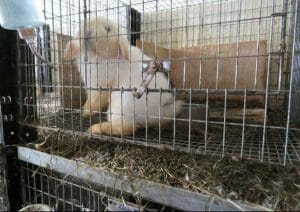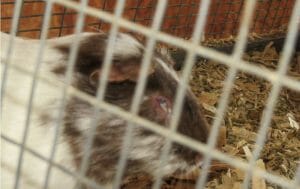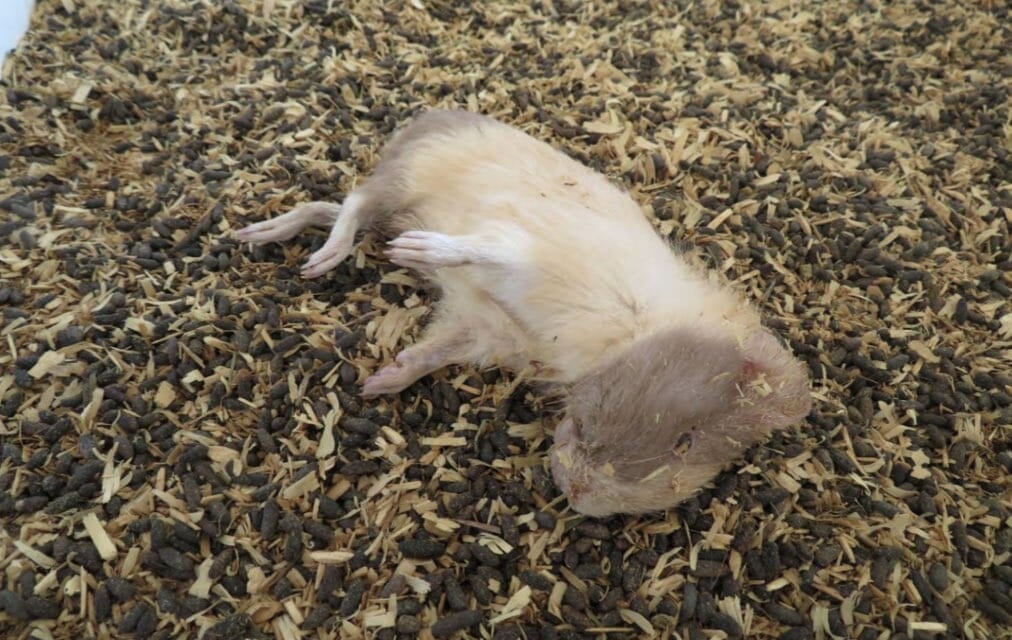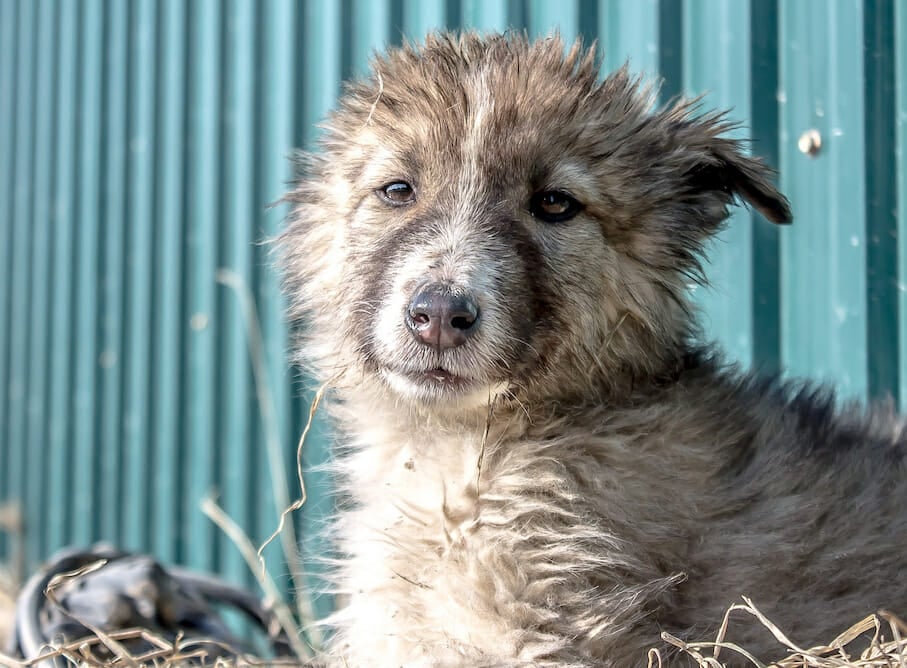PETITION TARGETS: United States Department of Agriculture and Pennsylvania State Police
UPDATE (6/6/2023): As of 6/6/2023, 26 of the breeders we covered have cancelled their licenses or had them revoked, and the USDA has taken enforcement action against several others. (Please see the bottom of this petition to see the enforcement action taken by the USDA following the release of our report.) However, of the 17 breeders still licensed, all but one had additional violations since we’ve published our report. We’re continuing to watch these tragic cases and advocate for these guinea pigs. – Lady Freethinker Staff
*
A sick newborn guinea pig — his eyes sunken and crusted shut — quivered in an enclosure crowded with 13 adults. Another newborn with an untreated eye abnormality also stared at the world through swollen, crusted eyes.
Nearby, a third newborn — dead, and trampled by other guinea pigs to become “embedded” in the feces-saturated bedding — also caught the eye of an inspector from the United States Department of Agriculture (USDA).
The more than 1,200 guinea pigs — suffering from untreated illnesses, filthy conditions, and a lack of access to clean food, water, and bedding at the single Pennsylvania breeder’s licensed facility — were just a fraction of the small animals who faced similar deadly conditions in dozens of USDA licensed facilities throughout the state of Pennsylvania.
A Lady Freethinker investigation uncovered issues of noncompliance with federal animal welfare mandates for small animals that spanned nine Pennsylvania counties and 44 breeders, including severely ill or dying animals going without medical care and animals with hair loss, skin and eye abnormalities, masses, swollen and lame feet, and muscle wasting.
Thousands of the animals had no access to clean food or water at the time of USDA inspections, and inspectors noted enclosures encased in spiderwebs, with floors falling out or holes large enough to let guinea pigs escape. Two breeders were using blunt force trauma — or hitting animals with heavy objects to kill them — in violation of the federal Animal Welfare Act.

(Courtesy of USDA)
Yet only two of these licensed breeders received any official enforcement action from the USDA, although some had multiple noncompliances cited in the same year, and some had noncompliances back through 2014, according to a USDA enforcement database.
In the very few instances of accountability, state law enforcement, acting on animal cruelty tips, were the ones who stepped in for some of these innocent animals suffering in silence.
These thoroughly inhumane and unacceptable conditions for guinea pigs and small animals — which appear to be the “norm” for more than two-thirds of the licensed guinea pig breeders in Pennsylvania — must stop. Conditions must be immediately improved to comply with federal animal welfare mandates, or these breeders must face accountability for their actions.
Sign our petition urging the USDA to penalize breeders whose operations clearly and repeatedly violate animal welfare standards and cause innocent animals to suffer — as the agency is supposed to be doing anyway.
We’re also asking state law enforcement to open animal cruelty investigation cases at these facilities.
After signing, you can read about LFT’s full investigation here.

(Courtesy USDA)
USDA ENFORCEMENT ACTION SINCE THE RELEASE OF LFT’s REPORT
- The USDA on 2/3/2022 filed an official warning against hamster breeder Rodney Bauman, of Perry County, alleging violations of indoor and outdoor facilities needing to be sound and citing an Oct. 20, 2021 inspection, in which an inspector wrote that Bauman reportedly was not maintaining records on the number of hamsters on hand. The inspector also found a dead Syrian hamster in a wall vent who reportedly had escaped his enclosure, crawled into the vent, and gotten struck by the fan, as well as a buildup of dust, dirt, and cobwebs, according to the report. Inspectors did not note any noncompliances at Bauman’s most recent inspection on Jan. 25, 2022
- The USDA on 2/25/2022 filed an official warning against Malinda and David King, of Lancaster County, for alleged violations of providing adequate veterinary care and cited inspections from Oct.27, Nov. 2, and Nov. 17, 2021, in which guinea pigs were documented as having hair loss, crusty skin, and scabs. The inspection reports also show that one adult guinea pig with “multiple open wounds and hair loss with gaps in the top layer of skin with underlying tissue exposed” was killed following the inspection “by a family member in a manner not in accordance with the program of veterinary care” rather than receive proper care. The inspection reports also documented seven juvenile guinea pigs found dead in enclosures as well as repeated issues with sanitation and ventilation, according to the report. The warning noted that additional, documented noncompliances may result in civil penalties, but no additional enforcement actions have been taken to date, according to USDA enforcement records, despite a recent inspection on Feb. 24 resulting in five documented noncompliances, including guinea pigs with hair loss, crusty skin and scabs, loose guinea pigs, sanitation and storage issues, and an overcrowded enclosure housing 19 weanling guinea pigs in a space only large enough for 10, according to the inspection report.
- The USDA on 3/3/2022 filed an official warning against Levi Stoltzfus, of Union County, for alleged lack of veterinary care in citing a Jan. 21 inspection. That report documents four guinea pigs with health conditions, including a weanling guinea pig with lameness and “small sore areas” on his legs where “skin was red that appeared to be due to dragging of the hind legs,” according to the report, as well as three guinea pigs with untreated masses. Stoltzfus had two additional issues of noncompliance documented during a Jan. 21 inspection this year, but had no noncompliance noted at his most recent inspection on Feb. 1, according to USDA documents.
- The USDA filed an administrative complaint – a serious enforcement step that can lead to a revoked license – on 3/22/2022 against Amos and Katie Stoltzfus, of Clinton County. The complaint alleges that the Stoltzfuses failed to identify and contact their veterinarian about guinea pigs with medical conditions – including guinea pigs with untreated masses, swollen feet, and increased respiratory efforts and lethargy, according to the corresponding reports – as well as reportedly failing to ensure adequate ventilation, proper temperatures, or to provide their animals with potable water and adequate food, according to the complaint. The agency followed up with a civil penalty of $2,500.
- The USDA fined Joshua Stoltzfus, whose licensed business was in Bellefonte before he voluntarily terminated his license, a civil penalty of $40,000 for animal welfare violations.
- The USDA permanently revoked the federal license for Clinton County breeder Aaron Esh. The settlement agreement prevents Esh from ever again commercially breeding guinea pigs or any other animal covered by the federal Animal Welfare Ac. The agency also fined Esh $3,000, according to USDA records.
The USDA also revoked the license of York County breeder Mose Zook, Jr. for sanitation issues, failure to follow his veterinary plan or properly treat animals, and failure to provide adequate space or drinkable water to guinea pigs. Zook must sell, transfer, or donate all of his guinea pigs within the next 12 weeks, although the agency will allow him to keep some of the animals for his “personal use” upon written request, according to the settlement agreement.
- Clinton County breeder Levi King will have to pay $4,400 in fines for sanitation issues, including feces-filled food, as well as failing to keep guinea pig enclosures repaired properly or warm enough, according to USDA documents.
- The USDA also has filed an administrative complaint — a serious step toward imminent fines or possible license revocation — against Clinton County breeder John Kauffman, who refused to allow federal inspectors to conduct a welfare check at least once and who also failed to provide proper veterinary care to numerous animals suffering in part from hair loss, lameness, and swollen and crusty eyes, according to the USDA.


